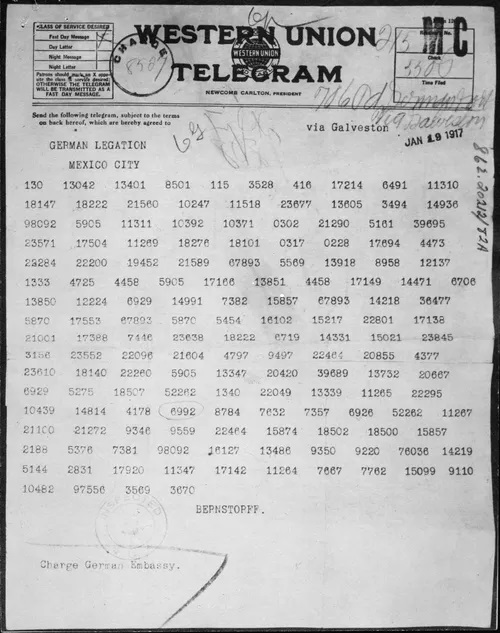The Zimmermann Telegram was an encrypted diplomatic message sent by Arthur Zimmermann, the German Empire’s Foreign Minister, to the Mexican government in 1917 during World War I. The purpose of the telegram was to persuade Mexico to join the war as a German ally if the United States entered the conflict. This telegram played a crucial role in the United States’ decision to enter World War I. Here, we will explain its background and impact in more detail.
Background
- World War I Situation: The First World War, which began in 1914, had intensified, with Germany fighting against France, Britain, and Russia. Germany was seeking new strategies to change the course of the war.
- American Neutrality: Initially, the United States maintained a neutral stance in the war. However, due to Germany’s unrestricted submarine warfare and its support for Britain, public opinion in the United States was gradually shifting in favor of the Allies.
Contents of the Telegram
The main points of the Zimmermann Telegram were as follows:
- Alliance Proposal with Mexico: Germany attempted to persuade Mexico to wage war against the United States. Germany promised to help Mexico reclaim Texas, New Mexico, and Arizona.
- Cooperation with Japan: The telegram also suggested that Mexico cooperate with Japan to counter the United States.

Discovery and Decryption of the Telegram
- British Decryption: On January 16, 1917, Room 40, the cryptography team of the British Naval Intelligence, decrypted the telegram. Through this, Britain became aware of Germany’s plans.
- Notification to the United States: Britain decided to inform the United States of Germany’s plans. On February 24, 1917, Britain conveyed the contents of the telegram to the United States, causing a significant shock to the American government and its citizens.
Impact
U.S. Entry into the War: The contents of the Zimmermann Telegram made the United States take the German threat seriously. On April 6, 1917, the United States declared war on Germany, thus entering World War I.
Course of the War: The U.S. entry into the war provided a significant boost to the Allies, playing a crucial role in turning the tide of the war in their favor.
Conclusion
The Zimmermann Telegram is one of the most significant events in diplomatic history, as it led to the failure of Germany’s diplomatic strategy and drew the United States into the war. This change altered the course of World War I and had a profound impact on international relations in the post-war period.
The Zimmermann Telegram remains a representative case highlighting the importance of cryptography and diplomatic policy at the time.